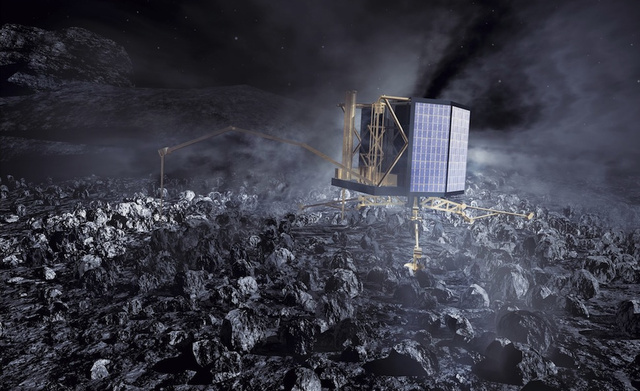Europe Is Going to Land on a Comet in November 2014
Dec 11, 2013 19:53

A European spacecraft will touch down on a two and a half mile wide ball of ice and dust as it makes its way towards the sun. That's right. Europe wants to land on a comet.
If all goes according to plan, the feat could give us what we need to understand about the origins of life on Earth. Any attempt, up until now, to study a comet has involved either flying by them to match their speed, or to crash into them hoping some of its material will break off to offer some insight.
Europe's new spacecraft has spent 10 years in the making, and in November 2014, it will finally attempt to stalk its comet prey.
Dubbed Rosetta, it was launched in 2004 and has been hibernating in sleep mode since 2011 to save power as it waits along the outer-edge of the solar system to catch the Churyumov-Gerasimenko comet. On 10am January 20, Rosetta will wake up and get ready to catch the comet.
When it awakens, it will start taking navigational sightings of the comet, and give scientists the information they need to take note of any unexpected shift in the comet's path.
By August, the spacecraft will finally have made its way into Churyumov-Gerasimenko's vicinity and will construct a map of its surface. Rosetta plans to land on the comet in November.
Because Churyumov-Gerasimenko has no gravity, Rosetta will have to use its blasters to maintain an orbit around it. The feat is definitely one more impressive than landing on Mars. hitch a ride.
As Dr. Chris Carr, the principal investigator on the imperial team, told The Telegraph:
It is very unusual to put something into hibernation when it has never been used before. To do it with something you've just spent several hundred million euros on, to switch it off and let it drift into planetary space for two years without any contact is totally unprecedented.
Speaking to Raw Story, Mark McCaughream, the agency's senior scientific adviser, elaborated on the team's tense nerves:If the alarm fails and Rosetta does not rouse itself, we will be in trouble. On the day, we will all be waiting in the control room, anxious to hear a signal from Rosetta. However, it will take several hours for the craft to complete its wakeup procedures before it transmits a message to Earth to let us know it is alive and well. It will be a nerve-wracking day.
Lets hope this is a success. Till November 2014. [AP, ESA, The Telegraph, Raw Story]







































































